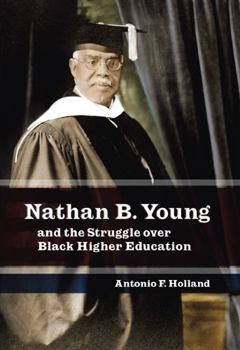Nathan B. Young and the Struggle Over Black Higher Education
(Part of the Missouri Biography Series)
At the turn of the twentieth century, African Americans eager to improve their lives through higher education were confronted with the divergent points of view of two great leaders: Booker T. Washington advocated vocational training, while W. E. B. Du Bois stressed the importance of the liberal arts. Into the fray stepped Nathan B. Young, who, as Antonio Holland now tells, left a lasting mark on that debate.
Born in slavery in Alabama, Young...
Format:Hardcover
Language:English
ISBN:082621679X
ISBN13:9780826216793
Release Date:November 2006
Publisher:University of Missouri Press
Length:248 Pages
Weight:1.15 lbs.
Dimensions:0.9" x 6.4" x 9.2"
Age Range:18 to 10 years
Grade Range:Postsecondary to Grade 5
Customer Reviews
0 rating





